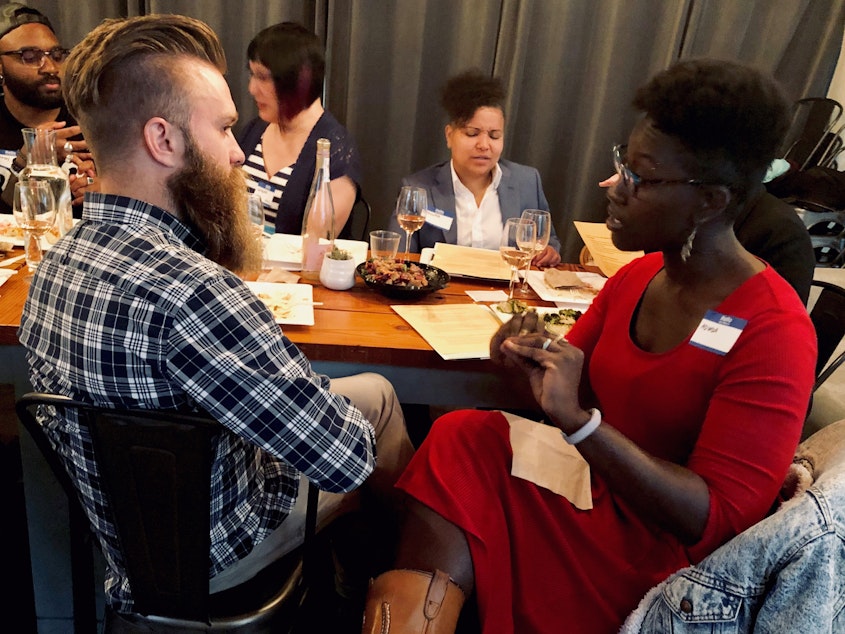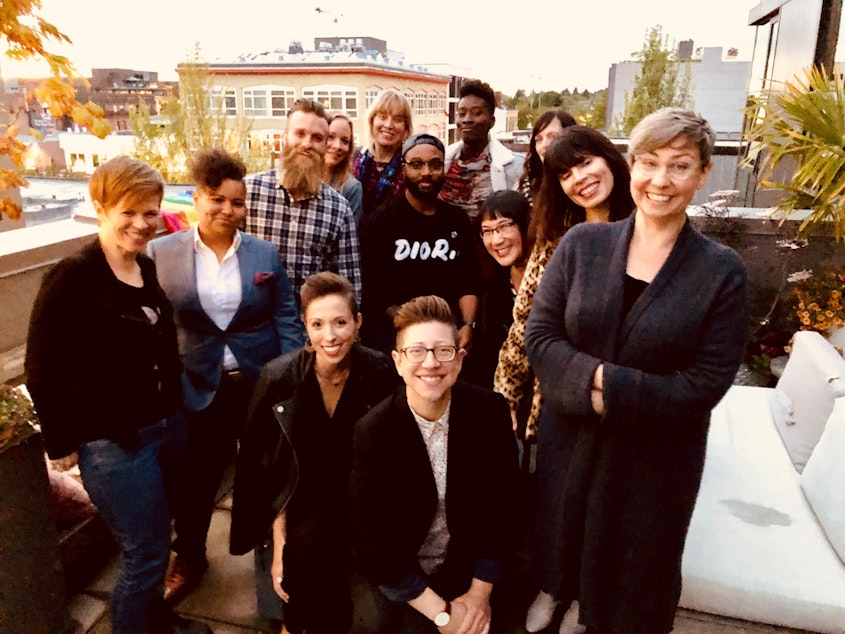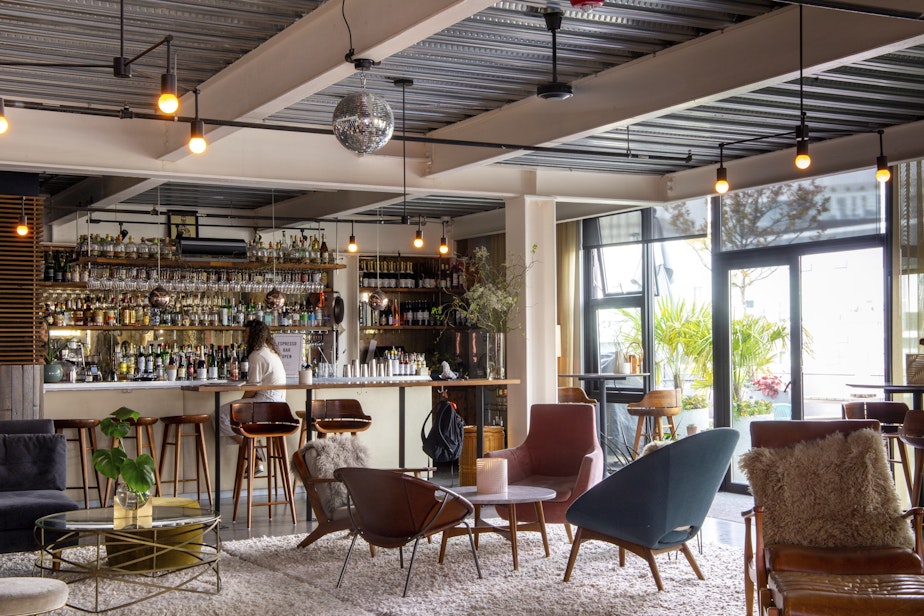A straight white guy walks into a queer dinner party...

Erraticus founder Jeffrey Howard reflects on how being a part of KUOW's Queeriosity Club changed him for years to come.
KUOW's Curiosity Club took a queer turn for Pride month. The question guiding Queeriosity Club was the same as for our larger Curiosity Club experiment: Can great food and compelling storytelling transform a group of strangers into a community?
All of the KUOW stories that fueled the dinner's conversation were centered on LGBTQ themes. The group gathered for dinner on June 6 at The Cloud Room on Capitol Hill.
Below, Jeffrey Howard reflects on his experience as the only heterosexual, cisgender, white male at the Club's LGBTQ-themed dinner party.
'These weren't my stories'
Equal parts terrified and excited, I sat around a narrow table as a diligent and, hopefully, empathetic interloper among traditionally marginalized voices.
I nodded as each person recounted the challenges of finding LGBT role models in school growing up. I listened as some shared about withstanding the backlash from their families and religious communities for their refusal to conform to norms surrounding gender and sexuality.
Sponsored
These weren't my stories but my regular ache for community provoked an uncomfortable feeling of envy. I focused my attention when each guest shared their perspective, keeping my face relaxed and sincere, my body as open to the emotions in the room as possible. I wanted to affirm the existence of every person there. I wanted to embody presence, for them to know they were being seen.
I was curious whether our identities — be they LGBT, ideological, political, religious, ethnic, or regional — would be used to vilify a soon to be identified outgroup. Alternatively, I hoped we might focus on our individuality as a way to celebrate our common humanity, to overcome our moral tribes.
Would we really be able to create a community, a group of people providing a way for others to be fed emotionally and socially?
Sponsored
A call out chills the conversation
At one point during the dinner, a participant shared a personally significant story about feeling alien among her friends because of her politically radical upbringing. While telling her story, she used the phrase “passing” to describe her experience of trying to fit in, at which point a fellow attendee reprimanded her for using language he felt was not appropriate for a cisgendered, white woman.
She took the correction well, but I wondered if it didn’t have a chilling effect on the emotional vulnerability of the group.
It was difficult to discern whether that was a brief moment of discomfort or if some felt a need to pick sides on the matter, thus dividing us in a small way.
Sponsored
My own experiences suggested it would have been more appropriate, and more effective, to talk with her privately about it had he still felt the need to address it later. Chastisements are rarely well received when they don't stand on an already built foundation of love and trust — two elements usually lacking among strangers.

Sponsored
An outsider at the table
Near the end of dinner, we were prompted to share the evolution of our personal style and the intentions that go into why we wear what we wear.
Many shared a history of deliberate thought regarding how to best integrate different identities into their style choices. Some talked about the challenge in choosing items of clothing that would allow them to remain authentic while navigating cultures hostile to non-conformity.
The contrast between my cohort’s intentionality and the limited energy I’ve historically dedicated to my manner of dress emphasized a theme that appeared throughout the evening: I felt other. As I continued listening, it remained obvious that the core experiences of my fellow dinner guests had a different bend than mine.
Sponsored
I was a straight, mostly-gender-conforming, white guy at an event designed for LGBT folks. Was I supposed to make it through the application process?
Finding common ground
Our varied identities appeared central to the evening but it was our commonalities that enabled emotional connections.
Jennifer and Ginger, both trans woman, confided in me about our shared interest in Authentic Relating.
Timothy and I both connected with the maxim that we should pursue our fears when determining a course of action (in part, what brought me to Queeriosity Club). As Joseph Campbell said, "The cave you fear to enter holds the treasure you seek."
Mellina and I found that we were both familiar with the unique challenges of growing up in minority religious communities.
Amanda and I sympathized over what a “labor of love” it is to be editors for magazines.
These were the moments that helped me feel valued, that showed me I might have a place at this Queeriosity Club table.
Did we thaw the Seattle Freeze?
The stories shared at Queeriosity Club moved me out of my comfort zone and opened up parts of me that had been closed off. By the end of the dinner, I felt that I had gained more confidence in my ability to connect beyond my usual social circles.
But did Queeriosity Club make us into a community?
We often think of community as a permanent or semi-permanent structure, a group of people we bond with over a lengthy period of time. However, I think we're better served looking for moments of community, instances where we're focused on sharing the here and now, when we’re vulnerable and determined to find common ground rather than fall back on our identities.
Acknowledging the experiences common among those of a particular race, sexual orientation, gender, religion, place of residence or even political outlook is critical, but it's just a starting point. We need to affirm our shared humanity and refrain from using our identities to justify our contempt for others.
It’s too soon, and perhaps futile, to consider whether our Queeriosity Club cohort is a community from an enduring perspective, but I can say the evening fed me emotionally (bringing me to the border of tears multiple times), and it grew me socially.
I won’t say we made a community yet, but we certainly had moments of community, and those will change me for years to come.
Jeffrey Howard is Editor in Chief of Erraticus. He's a former mental health professional and educator, now exploring questions surrounding the decline in community and civility, how individuals create meaningful lives, and how we can better navigate a post-religious world. He's an earnest nature-bather, captivated by Romantic landscape paintings. Jeffrey has made Cascadia his home since 2016. You can find him on Twitter @Jeffrey_Howard_.

Thank you to The Cloud Room, our KUOW Curiosity Club partner. The Cloud Room is a stylish co-working community and bar that’s enriched by the people who occupy it.




